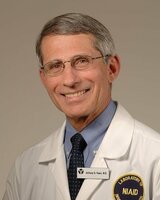Director of the National Institute of Allergy and Infectious Diseases
Dr. Fauci was appointed director of NIAID in 1984. He oversees an extensive portfolio of basic and applied research to prevent, diagnose, and treat established infectious diseases such as HIV/AIDS, respiratory infections, diarrheal diseases, tuberculosis and malaria as well as emerging diseases such as Ebola and Zika. NIAID also supports research on transplantation and immune-related illnesses, including autoimmune disorders, asthma and allergies. The NIAID budget for fiscal year 2020 is an estimated $5.9 billion. Dr. Fauci has advised six presidents on HIV/AIDS and many other domestic and global health issues. He was one of the principal architects of the President’s Emergency Plan for AIDS Relief (PEPFAR), a program that has saved millions of lives throughout the developing world. Dr. Fauci also is the longtime chief of the Laboratory of Immunoregulation. He has made many contributions to basic and clinical research on the pathogenesis and treatment of immune-mediated and infectious diseases. He helped pioneer the field of human immunoregulation by making important basic scientific observations that underpin the current understanding of the regulation of the human immune response. In addition, Dr. Fauci is widely recognized for delineating the precise ways that immunosuppressive agents modulate the human immune response. He developed effective therapies for formerly fatal inflammatory and immune-mediated diseases such as polyarteritis nodosa, granulomatosis with polyangiitis (formerly Wegener's granulomatosis), and lymphomatoid granulomatosis. A 1985 Stanford University Arthritis Center Survey of the American Rheumatism Association membership ranked Dr. Fauci’s work on the treatment of polyarteritis nodosa and granulomatosis with polyangiitis among the most important advances in patient management in rheumatology over the previous 20 years. Dr. Fauci has made seminal contributions to the understanding of how HIV destroys the body's defenses leading to its susceptibility to deadly infections. Further, he has been instrumental in developing treatments that enable people with HIV to live long and active lives. He continues to devote much of his research to the immunopathogenic mechanisms of HIV infection and the scope of the body's immune responses to HIV. In a 2019 analysis of Google Scholar citations, Dr. Fauci ranked as the 41st most highly cited researcher of all time. According to the Web of Science, he ranked 8th out of more than 2.2 million authors in the field of immunology by total citation count between 1980 and January 2019.
